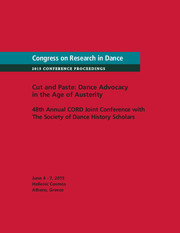No CrossRef data available.
Article contents
Reflections of Individual Cultural Identity in Dance: The Example of Two Bulgarian Immigrants in Athens
Published online by Cambridge University Press: 02 August 2016
Abstract
This study explores aspects of cultural identity of two Bulgarian immigrants, as these are reflected in their dance preferences in contemporary Athens. Using methodological tools of anthropological critique and the “new” reflexive anthropology, the study highlights the internal-personal and external (social, political, economic) factors that mold cultural identity over time, whereby the past becomes a key factor influencing the actions of people in the “present” context. The study draws on Timothy Rice's (1994) work—the comparison with the “protagonists” of his ethnography (Kostandin Varimezov and his wife Todora Varimezova) is inevitable—and discusses the meaning of music and dance for a couple of Bulgarian immigrants living in Athens while struggling—once more—with an economic crisis.
- Type
- Research Article
- Information
- Copyright
- Copyright © Chariton Charitonidis 2016




